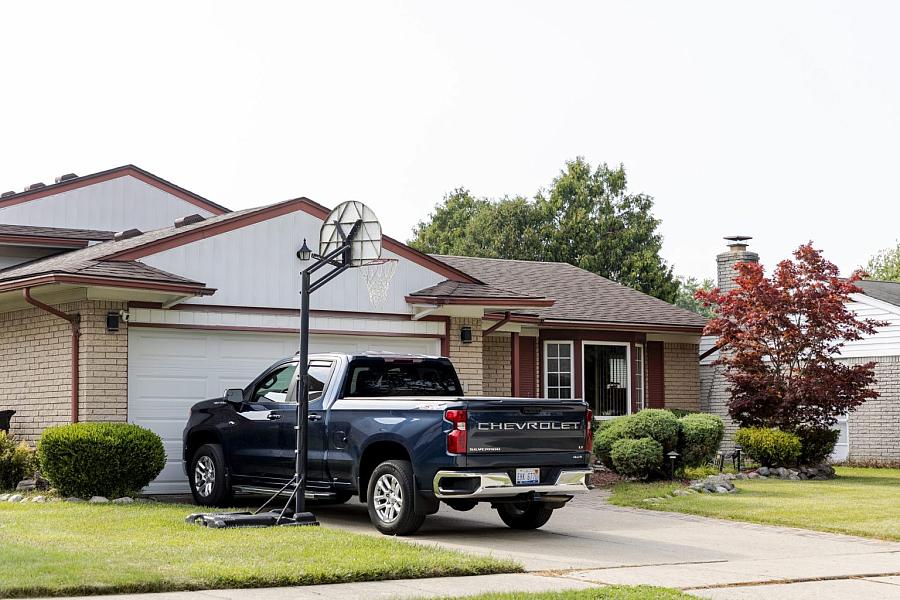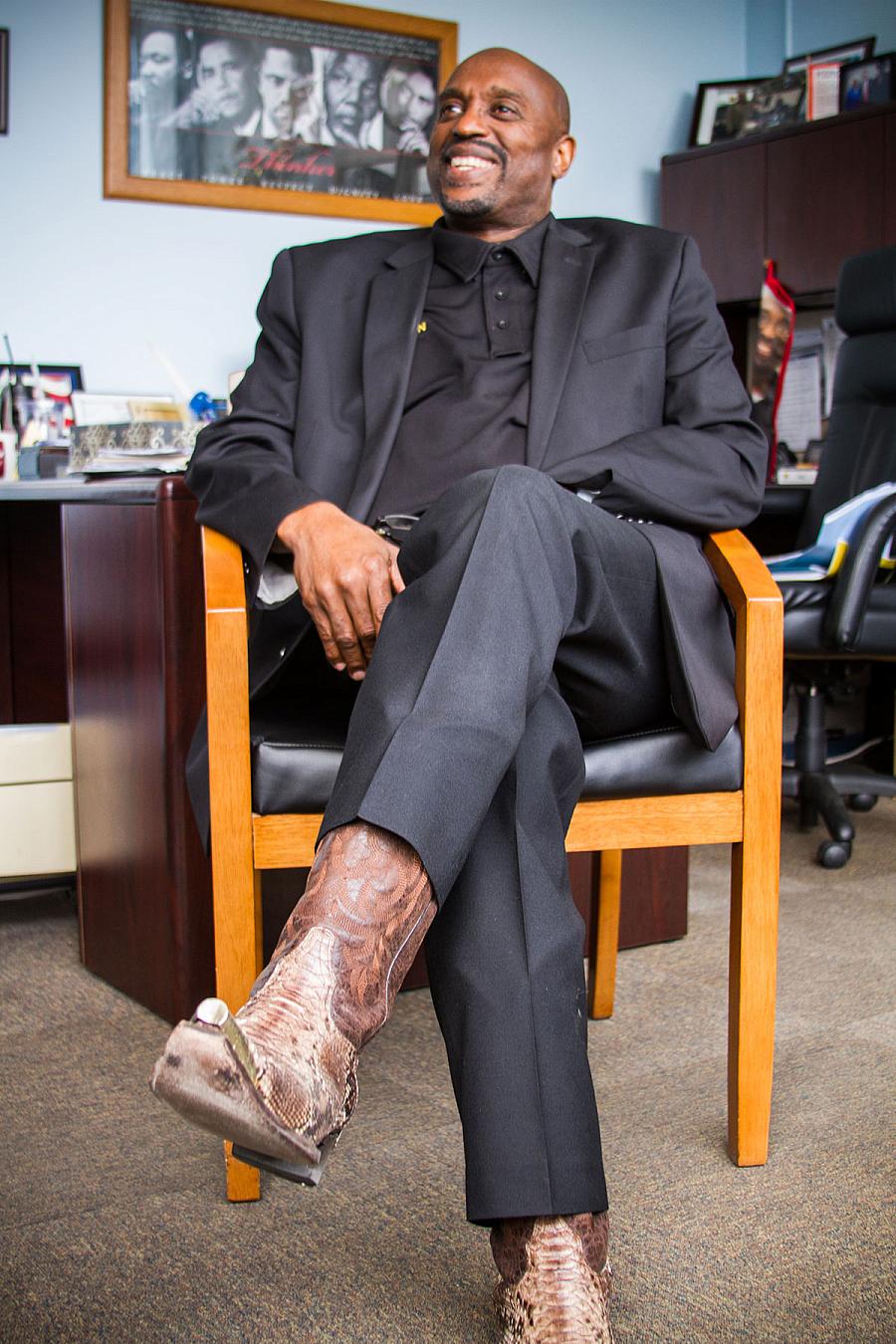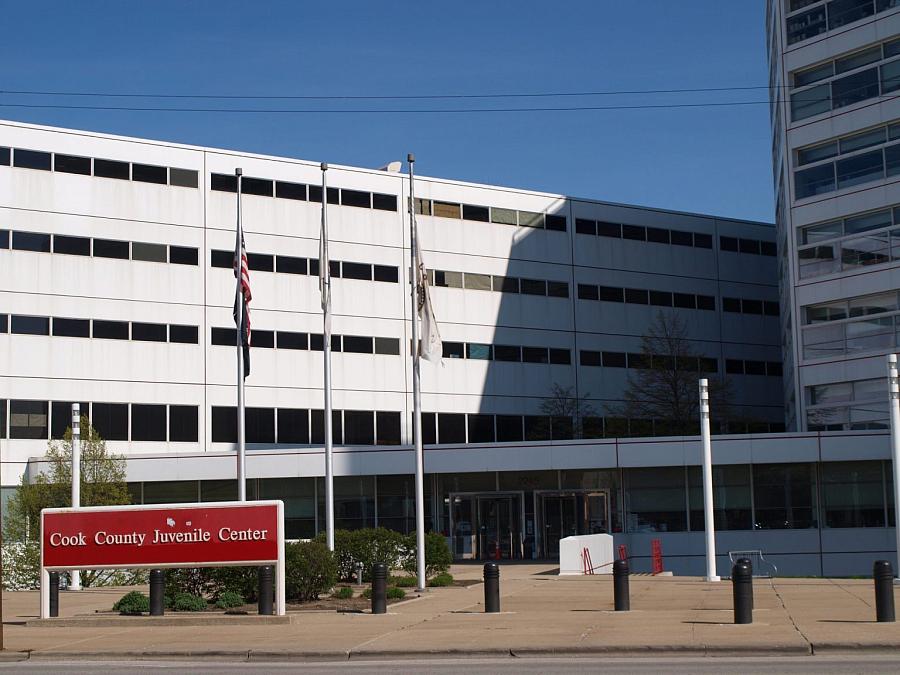Superintendent of Chicago’s youth jail might not live here, records show
The story was originally published by Injustice Watch with support from our 2025 National Fellowship.

Leonard Dixon, who has run the Cook County Juvenile Temporary Detention Center for a decade, has property in Michigan and Florida, and current and former employees say he’s rarely seen at the facility.
Illustration by Verónica Martinez
The walls inside and outside Superintendent Leonard Dixon’s office at the Cook County Juvenile Temporary Detention Center are lined with plaques from his decades-long career in juvenile justice and photos of the 69-year-old posing with smiling children and dignitaries, including former President Joe Biden and the late Congressman John Lewis.
But a new Injustice Watch investigation raises questions about how often Dixon himself is actually present at the facility he has run for the past 10 years — and whether he lives in Cook County.
Nine current and former employees of the detention center — many of them critical of what they describe as mismanagement and poor leadership at the facility — told Injustice Watch that Dixon is rarely seen.
And a trail of public records ties Dixon to a suburb outside Detroit, where he ran the juvenile detention center for nearly two decades before agreeing to move to Cook County for the superintendent job in 2015.
Dixon has been registered to vote in Michigan since 1995, and he has voted absentee consistently since 2012, including, most recently, in the 2024 primary and general elections, records show.
Dixon and his wife also own a house in Woodhaven, Michigan, for which they have received a property tax break reserved for a homeowner’s principal residence for the past 30 years.
“It’s an open secret. Everyone knows he’s not there,” said Fitzgerald Mullins, a retired juvenile detention center supervisor, who sued the county for retaliation after being suspended in 2017. “He would be there for a month straight when he first got the job. But as time went on, it slowed down.”
Dixon declined several interview requests. But approached by an Injustice Watch reporter outside a county board meeting in late July, he insisted he’s been living in Chicago since he took the job as superintendent a decade ago.
“I live in Chicago,” he said. When asked about his house in Michigan, he said his wife visited the property sporadically, “but no one is living there permanently.”

Leonard Dixon and his wife own this home in a suburb of Detroit, which they claim as their principal residence for property tax purposes. Records show the exemption has saved them more than $13,000 in property taxes since 2015, when Dixon became superintendent of the Cook County Juvenile Temporary Detention Center.
Sylvia Jarrus for Injustice Watch
Michigan law requires homeowners claiming a principal residence exemption to “dwell either permanently or continuously at a property and use the property as his or her principal residence,” according to guidelines published by the state treasury department.
On a recent visit to the Woodhaven address, a reporter found Dixon’s wife at home. She said he wasn’t there and asserted that the couple lives in Chicago.
Records show the exemption has saved Dixon and his wife more than $13,000 in property taxes since 2015.
Dixon and his wife also own a second home just north of Miami and two vacant properties in rural parts of Florida. As recently as May, they used their Michigan address when signing legal paperwork transferring one of those properties into a trust.
Dixon is one of the highest-paid county employees outside the health system. His current salary of $280,000 per year is more than that of County Board President Toni Preckwinkle or his boss, Cook County Chief Judge Timothy Evans.
After Injustice Watch began asking questions in July, Evans’ office hired an outside law firm to look into Dixon’s residency.
In an interview in August, Evans said, “The superintendent has to reside in the county of Cook, in the city of Chicago, in this particular instance, and we’ve been told that’s where he resides.”
On September 3, a spokesperson for Evans said the firm “has concluded that Supt. Dixon resides in Illinois.”
Dixon has a long track record of flipping troubled juvenile detention facilities into national models, but his tenure as superintendent in Cook County has been mired in controversy. For years, child welfare advocates have decried some of the facility’s practices, including prolonged room confinement, unnecessary strip searches, and excessive restraint. Some have suggested Dixon should be fired.
Last year, at least 19 former detainees alleged that they were sexually abused at the juvenile detention center while it was under Dixon’s leadership. The allegations were part of a larger class-action lawsuit against Cook County by nearly 200 former detainees who said they were sexually abused while detained between 1995 and 2022.
“I am deeply concerned about the allegations that a leader in Cook County is not holding himself to the same residency standard required for most Cook County employees,” Commissioner Jessica Vásquez said in an emailed statement to Injustice Watch. “These allegations are particularly troubling given that he is charged with the enormous responsibility of overseeing juvenile detention, an area that the county is working to transform to better meet the needs of our young people.”
Earl Dunlap, Dixon’s predecessor running the juvenile detention center and one of his references for the job, said he thinks of the role of superintendent as similar to being a parent.
“Every superintendent has the responsibility for the welfare of the kid that they’ve got in custody because they are, in effect, substitute parents under the direction of the court,” Dunlap told Injustice Watch.
“It’s just unacceptable for the superintendent to be gone more than they’re there, or not present, or whatever the circumstances may be,” he added.
‘Gritty newcomer’
When Dixon was picked to run the Cook County Juvenile Temporary Detention Center in 2015, it had been 16 years since the ACLU filed a class-action lawsuit challenging the “deplorable” conditions at the facility and 8 years since a federal judge appointed Dunlap as a transitional administrator to oversee day-to-day operations of the juvenile jail and issue regular reports to the court.
The 15-member hiring committee convened by Evans — made up of elected officials, legal experts, and child psychologists — conducted a national search and attracted 45 applicants for the job. One member, former Cook County Commissioner Larry Suffredin, said Dixon stood out for his accolades and years of experience.
“As I remember, the vote was unanimous,” said Suffredin. “I don’t remember there being any dissent. He seemed to have the right combination of experience, knowledge in the field, (and) accepted respectability in the field.”
Dixon came from a family of law enforcement officers in South Florida. His father was a sheriff’s deputy, his uncle was a police officer, and his brother was the first Black police chief in Miami.
He rose through the ranks of the Miami-Dade County juvenile justice system, eventually becoming director of four halfway houses and the juvenile detention center.
In 1995, Dixon moved to Detroit, where he oversaw the transformation of the Wayne County Juvenile Detention Facility, which at that point was one of the worst in the country. A year before Dixon’s arrival, the U.S. Department of Justice had opened a civil rights investigation into the Wayne County facility after reports of overcrowding and physical abuse of children by adult staff.

Leonard Dixon ran juvenile jails in Detroit and Miami before being hired as superintendent of the Cook County Juvenile Temporary Detention Center in 2015.
José Alejandro Córcoles
During his first few months on the job in Detroit, Dixon was photographed by a reporter for the Detroit Free Press wearing his trademark cowboy attire — black suit, white shirt, brown cowboy boots, and a black Stetson cowboy hat — sitting laid back with his feet on a desk and a wide grin on his face. “Gritty newcomer,” read the headline, and underneath: “Youth home’s chief is confident, committed.”
Dixon espoused a community-focused approach, arguing that delinquency was not a problem the government could tackle on its own. He believed the community bore responsibility for children released after detention.
“Do you want them to come out knowing they have some place to go and be safe?” he said at the time. “Or do you want them to come out angrier?”
By the mid-2000s, Dixon was widely seen as a leading national expert on juvenile justice reform. He was appointed to several prestigious committees and boards. He testified before the U.S. Congress on the need for mental health care services for incarcerated youth as president of the National Juvenile Detention Association.
While still overseeing the Wayne County juvenile detention center, Dixon also began working as an outside consultant for troubled juvenile detention facilities for the DOJ. In 2012, a federal judge appointed him to monitor the Henley-Young Juvenile Justice Center in Jackson, Mississippi, which had been placed under a consent decree for reports of child abuse and dangerous conditions at the facility.
He remained the federal monitor in Mississippi after beginning his job as superintendent in Chicago. In progress reports he submitted to the federal court between 2016 and 2018, Dixon listed his Michigan address alongside his Cook County work email.
‘I’m not a desk person’
In an interview in December 2023 posted on YouTube, Dixon can be seen sitting in his office with his brown leather cowboy boots on as he describes his day-to-day life as superintendent of the juvenile detention center to the talk show host.
“We’re 24/7,” he said about the facility. “My day usually starts about 6, 6:15 in the morning, and I’m usually here until about 3, sometimes 5. And on the weekends, it varies based on what’s going on.
“I spend a lot of time on the units,” Dixon continued. “I’m not a desk person. I like to go up and meet with the kids, have conversations with them, and (be) hands-on. That’s very important to me, especially being a Black male, because I believe that if they can see successful folks, then they can gravitate towards them.”
Of the 200 kids at the juvenile detention center in late August, 80% were Black and 96% were male, according to data from the Office of the Chief Judge.
But the employees who spoke to Injustice Watch — whose tenures there ranged from a few years to three decades — all said Dixon was rarely seen at the facility and certainly not on the kids’ living units during their time there. They requested anonymity for fear of professional consequences.
One longtime current employee told Injustice Watch he’s only seen Dixon twice over the last ten years. Another said the superintendent is sometimes gone for months at a time and returns for a few days, only to leave again. A former employee said he remembered Dixon would regularly travel to Miami.
Meanwhile, outside experts have repeatedly raised concerns about conditions at the juvenile detention center under Dixon’s leadership.
In 2018, the Chicago Reporter found staff at the facility were regularly confining kids to their cells for hours at a time as punishment for misbehavior, despite research showing that prolonged solitary confinement exacerbates preexisting mental health issues. According to the Reporter, there was a 25% jump in punitive room confinement under Dixon between 2016 and 2017, despite the population at the juvenile detention center dropping by about 20%.
A report by experts at the non-profit Center for Children’s Law and Policy had urged the juvenile detention center to reduce its reliance on punitive room confinement, the Reporter found. But Dixon stood by the practice, saying confinement was a “behavior management tool” necessary to ensure the facility “doesn’t get out of control.”

The Cook County Juvenile Temporary Detention Center, at 1100 S. Hamilton Ave. on Chicago’s Near West Side, holds about 200 children on average. Children as young as 10 can be held there, but most detained kids are between 14 and 18 years old.
Injustice Watch file photo
The JTDC Advisory Board — a public body made up of child welfare experts and advocates appointed by the county board — published a report the following year criticizing the “alarming rise in the use of punitive room confinement.” The board said it was stonewalled multiple times while attempting to get data from Dixon and his staff.
Two years later, Evans reconvened the “blue ribbon” committee that had recommended Dixon’s hiring, tasking the members with studying the use of room confinement at the detention center. In a letter to Evans accompanying the committee’s final report in 2022, chair Gene Griffin, a retired child psychologist, suggested the chief judge should fire Dixon and replace him “with someone who has experience with rehabilitative programming and is committed to transforming the JTDC from simply housing youth within its charge to safely developing youth competency.”
In the report, which Evans didn’t release until Injustice Watch began asking about it, the committee said the facility’s approach to working with youth inside was “isolating and deprivational,” rather than rehabilitative and relational.
Dixon responded to the report with a point-by-point rebuttal of the committee’s findings. He said the detention center had “more than 30 visits, audits, and letters of commendation” from various institutions since the start of his tenure indicating the facility was “in excellent standing with no constitutional rights violations.”
But later that year, the Illinois Department of Juvenile Justice, which audits county juvenile detention facilities annually, found the Cook County juvenile detention center was out of compliance with state detention standards.
Officials cited evidence the facility was using punitive room confinement, including “240 occasions when 24 hours or more of confinement was administered.” They also found employees were conducting invasive strip searches on all kids entering the facility. State standards allow for the practice only when there is an “individualized, reasonable suspicion” of contraband.
In 2023, the Illinois Department of Juvenile Justice noted the facility had reduced its use of punitive room confinement, but not by enough to meet standards. That April, officials found 160 occasions when a child was sanctioned with more than four hours of confinement time, and 68 confinements between 18 and 24 hours. Officials also found strip searches were still being conducted on all youth.
The Administrative Office of the Illinois Courts, an office under the state supreme court that reimburses counties for juvenile detention staffing costs, began conducting its own inspections of county juvenile jails in 2022. In May 2023, officials there found the juvenile detention center did not have shower curtains for children in the bathrooms. Instead, officials found children were showering in their undergarments while being supervised by a staff member of the same gender. Since the showers are designed in an open communal style, officials said nothing was preventing an employee of the opposite gender from looking at the kids while they showered.
Also in 2023, Equip for Equality, a disability rights watchdog group, published a 96-page report criticizing “excessive confinement and dangerous physical restraint practices” and insufficient special education services. The group recommended the facility be shut down and urged the county to instead house youth in smaller, community-based settings.
Dixon, in a written response, said the report was “replete with gross misrepresentations, defamatory statements, and unsupported legal conclusions.”
But last year, Evans’ office unveiled a plan to drastically downsize the juvenile detention center and replace it with smaller “communities of care.” The plan, submitted as part of a federal grant proposal, said the facility would shrink to just 50 kids by the end of this year. As of late August, there were 200 children in the detention center.
At a county meeting discussing the plan in May 2024, Cook County Commissioner Bridget Degnen said any effort to make significant changes at the juvenile detention center under Dixon would “likely be thwarted because the leadership at the JTDC refuses to implement common sense, pragmatic, expert-related initiatives.”
Despite some outstanding concerns about practices at the JTDC from the two state agencies that audit detention centers, both found the facility in compliance with state standards in their most recent evaluations.
Throughout it all, Evans has continued to publicly support Dixon. At a budget presentation before the county board in July, Evans praised the superintendent, who was sitting directly behind him.
“Although we are pursuing a reimagined approach to helping juveniles, we have not forgotten about the JTDC that we currently have, and I just want you to know that the changes that are taking place there … have been positive,” Evans said.

